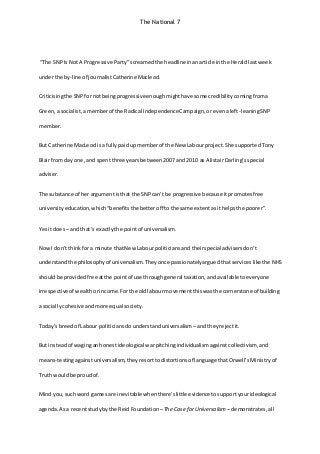
National 7(b) - universalism
- 1. The National 7 “The SNP Is NotA Progressive Party”screamed the headlineinanarticle inthe Heraldlastweek underthe by-line of journalistCatherine Macleod. Criticisingthe SNP fornotbeingprogressiveenough mighthave some credibility comingfroma Green, a socialist, amemberof the Radical IndependenceCampaign, orevenaleft-leaningSNP member. But Catherine MacLeodisa fully paidupmemberof the New Labourproject. She supported Tony Blairfrom day one, and spentthree yearsbetween 2007 and 2010 as AlistairDarling’sspecial adviser. The substance of her argumentisthat the SNP can’t be progressive because itpromotes free university education, which“benefits the betteroff tothe same extentasithelpsthe poorer”. Yes itdoes– andthat’s exactly the pointof universalism. Now I don’tthink fora minute thatNew Labourpoliticians andtheirspecialadvisers don’t understand the philosophy of universalism. They once passionately arguedthatservices like the NHS shouldbe provided free atthe pointof use through general taxation, andavailable toeveryone irrespectiveof wealthorincome. Forthe oldlabourmovementthiswasthe cornerstone of building a socially cohesiveandmore equal society. Today’sbreedof Labour politicians dounderstand universalism–and they rejectit. But insteadof waginganhonestideological warpitchingindividualismagainstcollectivism, and means-testingagainstuniversalism, they resorttodistortions of language thatOrwell’sMinistry of Truth would be proud of. Mind you, suchword gamesare inevitable whenthere’slittle evidence tosupportyourideological agenda. Asa recentstudy bythe ReidFoundation –The Case forUniversalism – demonstrates, all
- 2. The National 7 the evidence showsthat‘targeting’and‘testing’isintrusive, burdensome andexpensive, while societies whichembeduniversalismare the mostsuccessful, whicheverperformanceindicatoris used. In centuries past, Scotland ledthe worldbyintroducingfree elementary education. The resultwas the ScottishEnlightenment, thatextraordinary explosion of creativity inphilosophy,science, mathematics, literature, geology, chemistry, medicine andmany otherfields. Back in the 1980s, Neil Kinnock, the manwhobeganNew Labourproject, made a rousingspeech to a party conference inthe 1980s, inwhichhe asked:“Why am I the firstKinnock ina thousand generations togoto university? WhyisGlenysthe firstwomaninherfamily inathousand generations tobe able toget to university? Wasitbecause ourpredecessors were thick?Orbecause they didn’thave the talentorthe strengthor the endurance orthe commitment?Of course not.” It was, of course, all down to free education andstudentgrants. I don’tthink free education isall thatisnecessary. Ididn’tgoto university whenIleftschool – despite free tuitionandthe availability of grants. The impactof general inequality meantthatwhenI visitedthe cloisters of Glasgow University, Ifeltlikeanalienwhowould neverfitin. But free education hastobe one of the buildingblocksinthe construction of amore equal society. The four mostprogressive andegalitarianstatesinEurope – Norway, Denmark,Sweden andFinland – all have free education. Sodoa numberof left-leaningLatinAmericancountries. Scotland stands proudly among44 countries inthe worldthatsee accessto the highestformsof education asa right rather thana privilege. Withoutideasbasedoncollectivism, people wouldneverhave hadaccessto vital services suchasa publicwatersupply. Ittookvisionaries, withanethos rootedinuniversalism, todeliversuchthings. In the mid-nineteenth century, whenlifeexpectancy inGlasgow wasjust34, councillors tackledits
- 3. The National 7 dreadful publichealthproblembypumpingwaterintothe every household inthe city. Noone was means-testedbefore they were connected tothe mains. The ideaof universal provision paidforfromgeneral taxationreacheditspinnacle afterthe Second WorldWar. The Labour Government, inastate drained dry by the SecondWorldWar, poured everythingintoconsolidatingandexpandinguniversal healthprovision andestablishingthe NHS– a service the wealthy couldaccessaseasily asthe poor. I wonderif Catherine MacLeodisprepared to openly make the case fora “targeted”healthservice? Universalismisthe simplestandmosteffectiveway of ensuringthatservices, andfinancial help, gets to those whoneeditmost. “Targeting”, “assessing”, “testing”–rationinginotherwords – invariably keepsoutthe folk inmostneed. Andmistakes, fraudandoverpayments are more likely inthe bureaucraticsystems createdtoadministersuchrationing. The beauty of universal services isthatthey are inclusive. Idon’twantto live inasociety where the wealthy are isolated ingatedcommunities. Idowantto live ina society where we’re all equal citizens, enjoyinguniversal services asaright, and payingforthemintoone bigpot through progressive taxation. Iwantto live inasociety inwhicheveryone feelsthatthey have astake in our publicservices, irrespectiveof theirincome. It’susually the leftwhoare accusedof stokingupclassdivisions, buttoday’srightwingLabourParty seemintentongeneratinghostility towards studentsfrombetter-off backgrounds. AndIsuspect that if Catherine Macleodhadbeenaround inGlasgow inthe 19th century, she’dbe complaining aboutthe wealthy gettingwaterfromLochKatrine. Now, if she were tostart talkinginstead aboutwhethertheirparentswere payingafairand proportionate amountintothe general taxationpot, Imightstart takinglessons fromheronwhatis and whatisn’tprogressive.